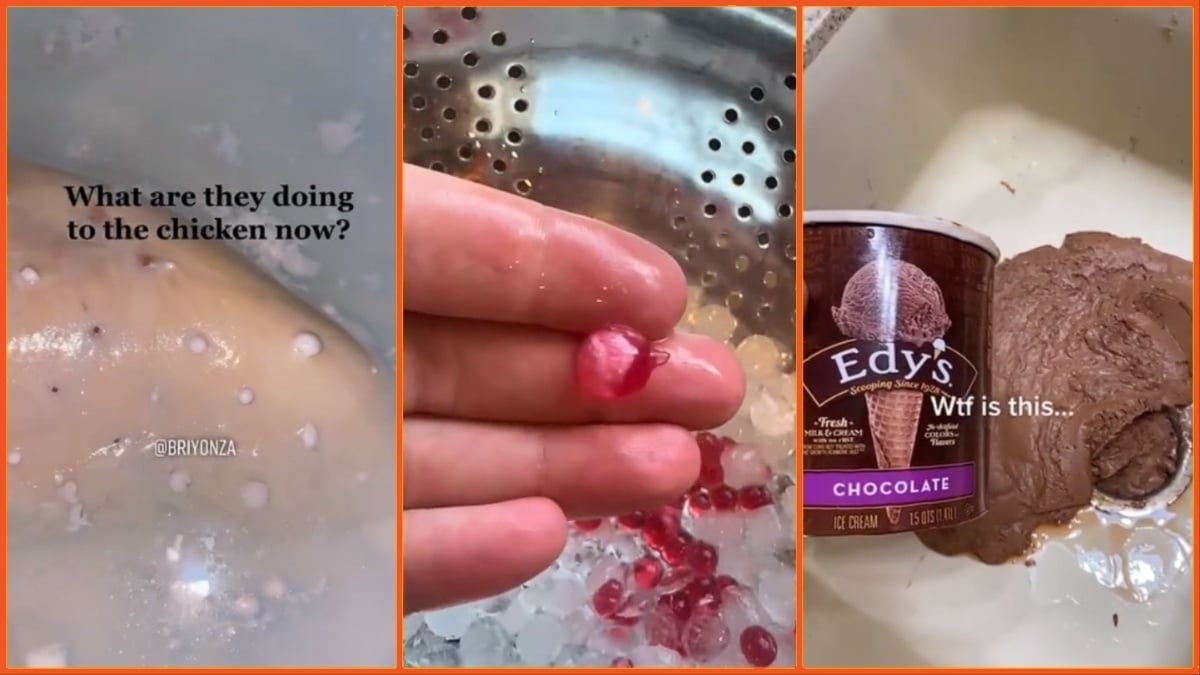In the year of our lord 2024, there are so many things to keep track of that it’s getting overwhelming. As fast food prices soar, consumers who don’t cook from scratch often are running into kitchen dilemmas that span far beyond the recipe.
Folks on TikTok have compiled a list of the sketchiest foodstuffs online, and surprisingly, not a single one is smothered in cheese. No, these aren’t recipes you’d have to be insane to try, but rather individual components that are giving viewers the ick.
The TikTok courtesy of @coinflipenergy compiles several different videos of highly suspicious food. From chicken breasts filled with so many little holes it will trigger some folk’s trypophobia to hissing watermelon, the video left users feeling some kind of way.
But in the age of the internet, a reasonable explanation is just moments away. With a little patience and a willingness to learn, each and every one of these — the chicken, the watermelon, the boba, and the ice cream — has an explanation, though some won’t make you feel any better about ingesting those not-so-delicious morsels.
While that chicken breast might be incredibly unnerving, you’ve likely eaten a breast just like it before. Big brands like Tyson, Sam’s Club, and Costco commonly inject marinade — or simply extra chicken broth — into their frozen chicken breasts for flavor. The added juice helps plump up the cut of meat and gives it a little extra taste. The marinade is injected with a machine covered in syringes, leaving a pronged pattern across the flesh.
All that suspicious added content might make you want to grow your own food, but there are plenty of difficulties that come along with the agricultural lifestyle — just take a look at the watermelon clips.
For people who never had the opportunity to harvest their own fresh fruits and vegetables, it can be hard to know the signs of over, or under-ripe food. There are myriad factors that affect a harvest. High temperatures — like those record-breaking temps we keep reading about — lead to crops ripening faster, meaning they rot more quickly and are more susceptible to pests and disease.
In watermelon, a rubbery texture and a bitter taste are the first signs of spoiling. If you cut into a melon and aren’t rewarded with a juicy, crunchy bite, that fruit is already too ripe. It’s the result of the melon languishing in the heat. A watermelon’s thick rind might protect its tasty insides from insects, but it also keeps potential eaters from telling where the fruit is in the ripening process, even if it does smell sweet.
That thick rind also prevents any fermenting pressure from escaping, like the fizzy watermelon. Fermentation is the same process used to create wine and beers, but where beer utilizes yeast, wines typically rely on sugars. And while watermelon is far from the highest sugary fruit, it is one of the easiest wines to make at home with around 17 grams of sugar per slice.
Another key step in the process of fermentation is the absence of air. A watermelon rind won’t suffocate anyone anytime soon, but it makes for a pretty solid barrier to catch those essential gases inside. Like a can of your favorite soda, once that pressure inside of the watermelon is released, the carbon dioxide created during the fermentation process lets out an audible hiss.
As for Ms. Boba, her pearls are simply undercooked. Boba pearls are made with tapioca starch and brown sugar. Like other forms of starch, tapioca starch has a fun reaction to water. When the two are mixed, they make a slightly chewy ball of flavor. But that tapioca needs to cook at a high temperature to make it act right. They are typically boiled for around 7 minutes before being dumped into an ice bath.
Whichever exhausted Starbucks employee was in charge of the tasty little morsels that day simply took the pearls out a bit early. That foggy coloring is the unfinished tapioca just waiting to boil a bit longer.
As for Edy’s ice cream turning into a sink mud pile, that one was a little harder to unpack. Stabilizers are a big point of contention in the ice cream community — yes, that is a real thing. The creamy dessert uses emulsion stabilizers, like guar or xanthan gum to help slow melting, increase the creaminess, and reduce air bubbles in the final product. While home cooks might not add the (mostly) natural additives, anything you pick up at the store is laced with them.
Too much stabilizer can affect the ice cream’s texture, and in some extreme cases, as it thaws the dessert turns into more of a mousse than an ice cream. Seeing the remnants of the once tasty treat does cause alarm, but it’s likely the byproduct of too many stabilizing additives.
The moral of the story when it comes to TikTok is not to believe everything you see. Everything sounds unnerving with the “creepy horror ambient” music laid over it, and not everyone paid attention in science class.











Published: Jul 31, 2024 02:09 pm